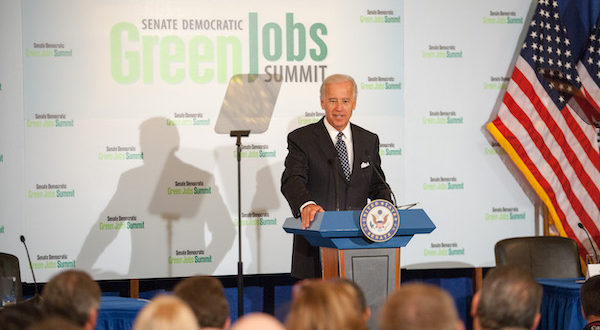President Biden developed the Build Back Better policy, promoting renewable energy-driven development in America. He plans on expanding the clean power industry, working towards a carbon-neutral energy grid and increasing employment in the industry. However, the solar tax credit expiration concerned many individuals, making them question our nation’s ability to eliminate fossil fuel-driven energy.
Fortunately, the government acknowledged society’s concerns and reevaluated the renewable energy tax incentives. As a result, the extension can help America reach its energy efficiency goals and shrink its carbon footprint.
Renewable Tax Credits’ Importance
Biden set ambitious clean energy goals upon entering office. Signing the U.S. onto the Paris Agreement committed the nation to climate change prevention efforts. The Agreement’s goal is to reduce the global temperature by two degrees Celsius below pre-industrial temperatures.
Achieving the goal requires all hands on deck. First, government, commercial and residential sectors must adopt energy-efficient technology and limit greenhouse gas emissions. One limiting factor is clean energy devices’ high costs.
The different sectors must utilize renewable energy to limit their carbon emissions. Eco-friendly devices help us meet the Agreement’s goal by reducing the enhanced greenhouse effect. When carbon emissions invade the atmosphere, they interfere with the Earth’s natural temperature control process.
Earth uses an organic process to maintain a life sufficient temperature. It absorbs solar radiation, generates heat, warms the surface and releases excess warmth to space. However, greenhouse gases overproduce heat from sunlight and trap extra heat in the atmosphere rather than sending it back to space.
Unfortunately, 80% of our national energy consumption derives from greenhouse gas emitting sources. Adopting renewable energy devices is essential to limiting the enhanced greenhouse effect. We can eliminate our carbon-emitting power source use by maintaining government assistance with clean energy purchases.
The Tax Extensions
The government extended the wind production tax credit (PTC) in December. However, it was nearing its expiration date when the COVID-19 relief bill and the federal spending package passed. Together the bills allocated two trillion dollars to the clean energy sector and pandemic relief.
Congresses extended the PTC for one year. They also passed a 30% tax incentive for offshore wind development until 2025. Geothermal energy faced a similar government tax extension following the relief fund.
The geothermal heat pump credit was 30% and expected to expire in 2020. Fortunately, congress extended the credit through 2022 at 26%. Unfortunately, it will now expire in 2024.
Solar investors additionally gained a tax incentive extension. The investment tax credit (ITC) contributed to the industry’s 42% growth since 2010. Without the incentive, environmentalists feared a decline in renewable energy purchases.
The government passed an ITC bill extending the solar incentive through 2024. After 2022, it degrades to 22% and then 10%. A limited extension of tax credits may help the U.S. meet its Build Back Better and Paris Agreement goals.
The Extensions’ Effect
Allocating the relief package to the renewable energy industry may help build back America after the pandemic. COVID-19 caused over 114 million job losses. We can increase employment opportunities while shrinking the U.S. carbon footprint.
Extending the clean energy tax incentives allows residents and companies to invest in renewable power devices. The high cost of solar, wind and geothermal sources, along with installation fees, keeps individuals from purchasing green technology. Instead, buyers can pay off their device purchases with government tax credits.
Increasing the purchase accessibility and appeal also raises employment. In addition, more renewable energy system sales call for more installations. As a result, the clean power industry must hire various new employees to meet rising demands.
Increasing clean energy employment can additionally improve the economy’s state. Reducing our national reliance on fossil fuels also improves the health of citizens and the environment. For example, increased air pollution significantly degrades lung health.
Rising surface temperatures cause increased air pollution and allergen production, damaging lung tissue and inflame the airways. We can protect environmental changes and lung health with renewable energy use.
How to Improve Air Quality
Many citizens received stimulus checks throughout the pandemic. You may utilize excess funding to invest in renewable energy and protect the environment. Over time, the more power we source from clean sources, the less atmospheric pollution we will emit.


